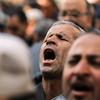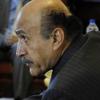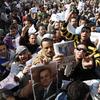Anwar Sadat Professor for Peace and Development at the University of Maryland.
Shibley Telhami appears in the following:
Will Arab Palestinians Have a Voice in Israel's Next Parliament?
Wednesday, September 25, 2019
The World Through Arab Eyes
Thursday, June 27, 2013
Political scientist Shibley Telhami analyzes the driving forces and emotions of the Arab uprisings and looks ahead to the next phase of Arab politics. In The World Through Arab Eyes, Telhami gives an account of Arab identity, revealing how Arabs’ present-day priorities and grievances have been gestating for decades. Many Arabs may have a wounded sense of national pride, but they also have a desire for political systems with elements of Western democracies.
Will Egypt's Elections Calm the Turmoil?
Monday, November 28, 2011
Egyptians headed to the polls today to vote in the country's first parliamentary elections since the ouster of President Hosni Mubarak. But the election hasn't come without a great deal of controversy: throughout the past week, protests against Egypt’s military rule erupted throughout the country. Over people were 40 killed, and more than a thousand were injured. How will this affect the validity of the elections? And, amid all this turmoil, should they have even happened in the first place?
Egyptian Army Clashes with Protesters in Tahrir Square
Monday, November 21, 2011
The Egyptian army used teargas, rubber bullets and birdshot in clashes with protesters in Cairo over the weekend. Parliamentary elections are scheduled to begin in stages a week from today — but this violence raises questions about whether free, democratic elections are possible at this time in Egypt.
Crackdown Against Protesters in Syria as the Ramadan Holiday Begins
Monday, August 01, 2011
Syria’s government cracked down on democratic protesters in the city of Hama on Sunday, leaving as many as 130 dead, according to activists there. Tanks and troops entered the city early Sunday morning, in a brutal show of force just as the holy month of Ramadan begins. There’s further tension in the Middle East this week, as Egypt's former President Hosni Mubarak, his two sons and seven associates, will begin trial on Wednesday in Cairo for charges of corruption and ordering the killings of protesters. The trial will be televised. And in Libya, rebel commander Abdel Fattah Younes was shot dead Friday by Islamist-linked militia.
Middle East News Roundup: Bahrain, Morocco, Syria
Friday, April 29, 2011
It's been another tumultuous week in the Middle East. Another Day of Rage is planned today in Syria, and European governments are meeting to discuss possible sanctions. Meanwhile, human rights activists claim that the four anti-government protesters in Bahrain—who were sentenced to death on Thursday over the killing of two policemen—did not receive a fair trial. And in Morocco, at least fifteen people were killed and more were injured after a suicide bomber attack in a popular restaurant. Shibley Telhami, Anwar Sadat Professor for Peace and Development at the University of Maryland, speaks with us about the news coming out of the Middle East.
Wave of Change: Dawn of a New Egypt as Mubarak Steps Down
Friday, February 11, 2011


This is the ninth and final edition of Wave of Change, a special podcast from The Takeaway, covering the mass protests in Egypt and the consequences for the wider Arab world, hosted by John Hockenberry with Celeste Headlee.
Egypt's three-week-long anti-government revolt reached a happy denouement today when Hosni Mubarak, the country's autocratic leader of nearly thirty years, stepped down, ceding power to the Supreme Council of the Armed Forces. In today's Wave of Change, we bring you a medley of jubilant voices from Cairo, where after 18 days of protest, people power won over the forces of an oppressive regime.
Must Peaceful Protest Be Abandoned?
Friday, February 11, 2011
President Mubarak's refusal to step down on Thursday turned the mood in Tahrir Square from hopeful anticipation to fury in a matter of minutes. Many see Mubarak's response as a direct rebuff to peaceful protest. Is violence the next (and last) resort?
Shibley Telhami on Events in Egypt
Friday, February 11, 2011
So far the renewed protests have remained peaceful, notes Shibley Telhami, Anwar Sadat professor for peace and development, University of Maryland and a Senior Fellow at the Brookings Institution. He helps wade through the news coming out of Egypt and says that clearly the Mubarak regime is not to be trusted.
Obama Administration Discusses Plans for Interim Government in Egypt
Friday, February 04, 2011
The New York Times has reported that the Obama administration is discussing a proposal with Egyptian officials for President Hosni Mubarak to step down immediately and hand over power to Vice President Omar Suleiman. Under this proposal, Suleiman would run a transitional government until elections are held later this year. Before being appointed to the vice presidency last week, Suleiman was the coordinator of the CIA’s extraordinary rendition program.
Egyptian Protests Enter 11th Day
Friday, February 04, 2011
It's day eleven of Egypt's populast uprising. What began with relatively peaceful demonstrations turned into a standoff between anti-regime protesters and the Egyptian military. Thursday saw a turn for the worse, as violent Mubarak supporters joined the fray bringing with with them clubs, straight razors and Molotov cocktails.
Wave of Change: Nicholas Kristof in Cairo; Pro-Mubarak Groups Clash with Protesters, Egypt's Future
Wednesday, February 02, 2011


This is the second edition of Wave of Change, a new special podcast from The Takeaway, covering the mass protests in Egypt and its consequences for the wider Arab world, hosted by John Hockenberry with Celeste Headlee.
In today's episode, New York Times columnist Nicholas Kristof recaps the latest developments from Cairo; a "face in the crowd" interview with 28-year-old protester Adham Bakry, who fled Tahrir Square when violent clashes broke out between anti-government protesters and pro-Mubarak groups; a historical lesson from the Iranian revolution; and a Takeaway from this morning's show.
What's Next for the Egyptian Government?
Wednesday, February 02, 2011
"Mubarak is not a one-man show," says Anwar Sadat professor for peace and development at the University of Maryland, Shibley Telhami. He explains that there is large priveleged class in Egypt that benefits from the status-quo and is not going to be eager to see the change in leadership. He also takes a closer look at what will happen now that Mubarak has pledged not to run again and the constitutional changes that will need to take place in order to ensure a new democratic process.
Massive Protests Continue in Egypt
Tuesday, February 01, 2011
As the political tumult in Egypt enters an eighth day, the government of authoritarian President Hosni Mubarak suffered a major blow last night when the Army announced that it would not use violence to suppress the opposition movement that has formed against him. Meanwhile, protesters are expected to engage in a massive march and general strike calling for Mubarak's ouster today.
Update: Protests in Egypt, Changes in Jordan
Tuesday, February 01, 2011
Shibley Telhami, Anwar Sadat Professor for Peace and Development at the University of Maryland responds the news that Jordan's President has dismissed his government following protests in his country. King Abdullah has asked an ex-army general to forma new Cabinet.
Oil Prices Spike Amid Turmoil in Egypt
Tuesday, February 01, 2011
Oil prices have been floating around $90 a barrel for weeks, but now, the turmoil in Egypt has pushed the price up. Crude oil jumped close to 4% on Friday and then 3.2% yesterday to settle at $92.19 a barrel. However, the output of crude hasn’t changed in the region, so what exactly explains the sharp rise in prices?
Prince Hassan of Jordan on the Future of the Mideast
Tuesday, February 01, 2011
Jordan's King Abdullah has sacked his government following protests as thousands marched in Amman to protest rising prices and unemployment and to demand that the prime minister, Samir Rifai step down. Prince Hassan of Jordan reacts to the news and talks about the future of the Mideast and the view of Egypt from Jordan. Shibley Telhami, Anwar Sadat Professor for Peace and Development at the University of Maryland also weighs in.










